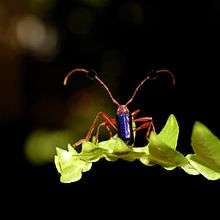Compsocerus violaceus
Compsocerus violaceus is a species of beetle in the family Cerambycidae. It occurs in South America, being common in southern Brazil, northern Argentina and Uruguay.[2][3]
| Compsocerus violaceus | |
|---|---|
 | |
| Scientific classification | |
| Kingdom: | |
| Phylum: | |
| Class: | |
| Order: | |
| Suborder: | |
| Family: | |
| Subfamily: | |
| Tribe: | |
| Genus: | |
| Species: | C. violaceus |
| Binomial name | |
| Compsocerus violaceus (White, 1853)[1] | |
Agricultural Pest
Compsocerus violaceus is considered an agricultural pest, attacking several cultivated tree species, such as acacias, eucalypts, willows, fig trees, citrus trees and peach trees. Eggs are laid on tree trunks, usually inside small fissures in the bark. After eclosion, the larvae build a gallery below the bark in branches with diameters between 2 and 6 cm and start to feed on the wood, taking about 10 months to become adults. Adults have been reported to feed on fruits, flowers, and sap leaking from injured tree trunks.[4]
Species that serve as host for Compsocerus violaceus include:[3][4][5]
- Anacardiaceae:
- Schinopsis balansae Engl.
- Schinus molle L.
- Celastraceae:
- Euonymus japonicus Thunb.
- Fabaceae:
- Acacia dealbata Link
- Acacia melanoxylon R. Br.
- Acacia praecox Griseb.
- Acacia visco Griseb.
- Adenanthera colubrina var. cebil (Griseb.) Altschul
- Bauhinia forficata subsp. pruinosa (Vogel) Fortunato & Wunderlin
- Calliandra tweedii Benth.
- Cercis siliquastrum L.
- Mimosa polycarpa var. spegazzinii Burkart
- Prosopis affinis Spreng.
- Prosopis hassleri Harms
- Prosopis nigra Hieron.
- Sesbania virgata (Cav.) Pers.
- Fagaceae:
- Castanea sativa Mill.
- Quercus robur L.
- Juglandaceae:
- Carya illinoinensis (Wangenh.) K. Koch
- Lauraceae:
- Lythraceae:
- Punica granatum L.
- Moraceae:
- Ficus sp.
- Myrtaceae:
- Eucalyptus sp.
- Oleaceae:
- Ligustrum lucidum W.T.Aiton
- Pinaceae:
- Pinus sp.
- Rosaceae:
- Cerasus vulgaris Mill.
- Crataegus sp.
- Mespilus germanica L.
- Prunus domestica L.
- Rosa sp.
- Rutaceae:
- Citrus aurantium L.
- Citrus limon (L.) Burm. f.
- Citrus sinensis (L.) Osbeck
- Salicaceae:
- Sapindaceae:
- Dodonaea viscosa Jacq.
- Sapotaceae:
- Chrysophyllum gonocarpum (Mart. & Eichler ex Miq.) Engl.
- Ulmaceae:
- Ulmus pumila L.
References
- Bezark, Larry G. A Photographic Catalog of the Cerambycidae of the World Archived 2013-08-27 at the Wayback Machine. Retrieved on 22 May 2012.
- Garcia, F. R. M.; Corseuil, Elio (1998–1999). "Flutuação populacional de cerambicídeos e escarabeídeos (Coleoptera) em pomares de pessegueiro no município de Porto Alegre, Rio Grande do Sul". Revista da FZVA (in Portuguese). 5/6 (1): 69–81.

- Gonzalez, O. E.; Di Iorio, O. R. (1996–1997). "Plantas hospedadoras de Cerambycidae (Coleoptera) en el noreste de Argentina". Revista de Biología Tropical (in Spanish). 44–45 (3–1): 167–175.

- Garcia, A. H. (1994). "Ocorrência de danos de Compsocerus violaceus (White, 1853) (Coleoptera, Cerambycidae) em pomar de citros". Pesquisa Agropecuária Tropical (in Portuguese). 24 (1): 148–153.

- Machado, Vanessa S.; Botero, Juan P.; Carelli, Allan; Cupello, Mario; Quintino, Hingrid Y.; Simões, Marianna V. P. (2012). "Host plants of Cerambycidae and Vesperidae (Coleoptera, Chrysomeloidea) from South America". Revista Brasileira de Entomologia. 56 (2): 186–198. doi:10.1590/S0085-56262012005000029. ISSN 1806-9665.

External links
- Friday Fellow: Violaceus longhorned beetle at Earthling Nature.